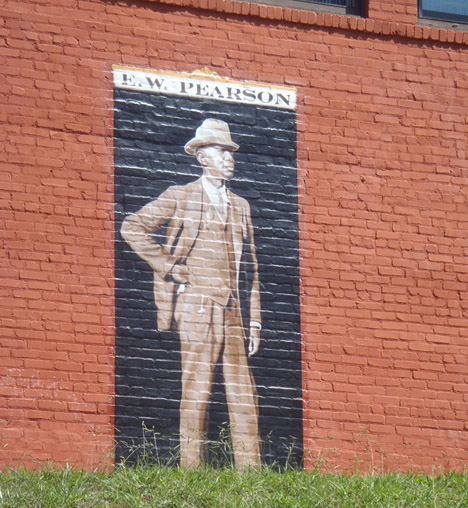The Burton Street Community Association, established in 1967 as the Burton Street Advisory Board, was formed for the purpose of promoting the educational, social, economic and cultural welfare of its members, improving the neighborhood through democratic citizen participation and involvement in activities which affect our everyday lives. The Burton Street neighborhood, founded in 1911 by dedicated civic leader E.W. Pearson, is a historically African American neighborhood located in West Asheville off of Haywood Road.
E.W. Pearson worked tirelessly to improve the quality of life for many African Americans, making many contributions to Buncombe County, the City of Asheville, and beyond. He organized Asheville’s first African American semi-pro baseball team, the Asheville Royal Giants (1916), founded the area’s first regional Agricultural Fair (1913-1947), and organized North Carolina’s first NAACP chapter (1933), as well as several fraternal groups.
Burton Street’s rich cultural history is something its residents would like to see preserved. Community Baptist Church, 103 Burton St., built in 1925, is the site of Wilson AME Congregation, established in 1888. Burton Street Community Center, 134 Burton Street, built in 1926, is the site of Buffalo Street School (1916-1965). Recently, the Burton Street Agricultural Fair has been revived. The 100th year anniversary celebration, in 2014, commemorated E.W. Pearson’s legacy with the unveiling of a larger than life mural painted on the back of community center. Renaming the community center, to honor the man who did so much for our community, only seems right.
Burton Street is a diverse community made up of elders, youth, folks whose families have lived here for generations, as well as new comers to the neighborhood. Some of the qualities that make Burton Street unique include strong community connections, determination, persistency, resilience and the ability to overcome many challenges: widening of Patton Avenue in the 1950s, I-240 expansion in the ’60s, drug infestation that took many years to battle, and the looming I-26 connector project.
Burton Street builds community cohesion through many events held in the neighborhood: plant sales, garden parties, agricultural fairs, holiday gatherings, Thanksgiving potluck, the many programs at the community center, including senior programs, youth programs, the 1-mic recording studio, and block parties that are designed to bring neighbors together. The Peace Garden, Hood Huggers, Green Opportunities and LEAF Schools & Streets are all community based, focusing on educating and uplifting individuals.
Burton Street’s dedicated active community members are passionate about continuing on a path of neighborhood revitalization, and look forward to building stronger and closer ties with new people moving in, expanding the capacity to be a model for other neighborhoods. Burton Street leads as a community, able to reorganize and rebuild among some of the greatest challenges in the City, setting our own path for success. We (the Burton Street Neighborhood Association) would like to see the adoption of the Burton Street Community Plan by the County and the City of Asheville, and believe this would be a move in the right direction in making our neighborhood an even better place to live.
Written and submitted by the Burton Street Neighborhood Association.
Burton Street Neighborhood Profile
